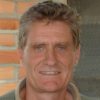Maryknoll Lay Missioner Richard Dixon introduces a handyman in El Salvador who repairs human spirits.
One of the beautiful privileges of mission is learning from the people of our host country and seeing life from their perspective. Agustin de la Rosa Reyes is one who has brought richness to my life here in El Salvador, where I serve as a Maryknoll lay missioner. He is a husband, father of three, and earns his living as a handyman. He knows how to adjust the chain on his son’s bicycle and change the throttle tube on my cheap Chinese motorcycle. But by vocation, he’s a listener and healer. He has taught me a lot about mentoring and listening.
He learned these skills in hard times. As a teenager during El Salvador’s civil war, he hid from anything that wore green and moved with boots: the Army, the National Guard, the Marines.
They all needed manpower for their war machine, which Agustin wanted nothing to do with. As soldiers swept through the community forcibly recruiting kids, Agustin, thin, light and clever, had found a favorite place to hide: on roofs of corrugated metal.
He managed to escape until he decided to visit his sister in the capital, where the National Guard swept him up in a raid at the central market while he was buying fruit, unthinkable to arrive at his sister’s house empty-handed. Three months later he was fighting in the bloodiest battle of the war, the rebel offensive on San Salvador in November 1989. He knows the demons of anxiety, fear and loneliness. “It’s where so much sickness takes root,” he says.
One Saturday morning during our base community meeting, which he coordinates, he shared his story of war trauma, not as an isolated piece of personal history but as a narrative belonging to something much bigger. He shared it as motivation for us to join him at the local soccer game that afternoon, to speak with players and other youth after the game. “Fear, anxiety, loneliness are what so many of our youth continue to live today,” he said and added this advice, “It doesn’t take much: A simple comment like nice goal, good pass, or how’s your knee after that shot you took last week? Kids light up with such comments.”
In our community of La Esperanza so many children end up half abandoned and orphaned when one or both parents emigrate. Young people cannot cross from one side of town to the other in peace for fear of gangs. And throughout El Salvador, especially in poor communities, you’d think it’s a crime to be young. Police and soldiers stop you constantly, put you against a wall, search and harass you, strip you of your shirt (checking for tattoos), and detain you in public, half naked.
Under these circumstances, it’s no coincidence kids make a beeline for Agustin’s house when they see trouble. And on any Saturday, you see Agustin on the soccer field or patio of his home sharing with kids, listening to their stories, feeling every word, letting the strength of shared experience work its healing.
Featured image: Agustin de la Rosa Reyes mentors kids in La Esperanza. (Rick Dixon/El Salvador)

